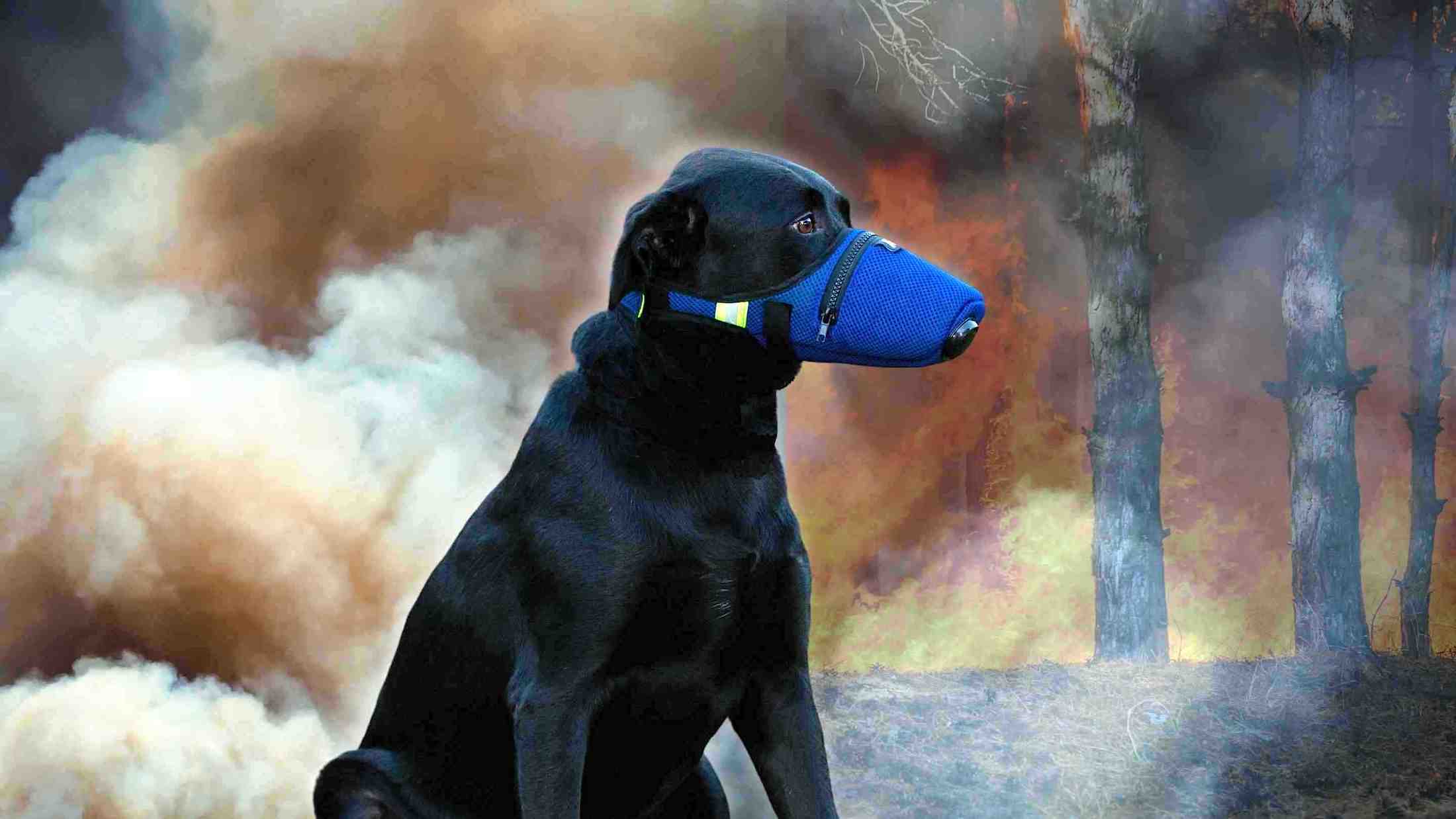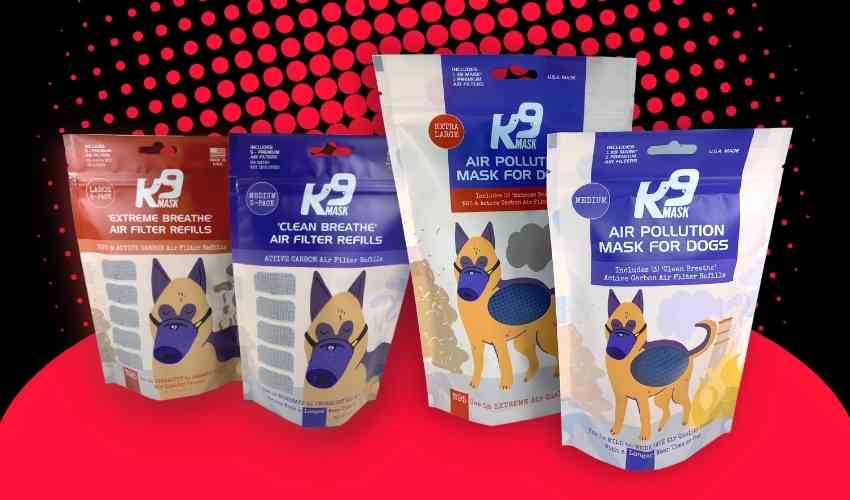People aren't the only ones who can suffer ill effects from exposure to air pollution. Many pet owners have concerns about the effects of air pollution on their animals, and scientists are beginning to study the potential risks for pets that have exposure to air pollution.
Research has confirmed the dangers of air pollution for humans. People who are exposed to excessive air pollution have an increased risk of developing respiratory issues such as wheezing, coughing, shortness of breath, and chest tightness. Cardiovascular disease is another potential health issue connected to exposure to air pollution. Those with pre-existing cardiovascular disease as well as elderly people and young children may even be at risk for premature death from pollution exposure..

Sources of Air Pollution
Air pollution originates from many different sources. Fumes from wildfire smoke, vehicle traffic, power plants, construction, the burning of coal and gasoline. Homes can be filled with pollution from sources such as wood-burning stoves and fireplaces, tobacco smoke, and cooking. Pets living in urban areas have a higher exposure to and risk from smog and exhaust pollutants, while animals living in rural areas may be exposed to chemicals due to the spraying of herbicides, fungicides, and insecticides.
Scientific Studies about Air Pollution
Studies have shown that pets living in homes with cigarette-smokers have increased health risks, perhaps even greater than those for humans living in the same homes. This is because pets spent more time near the floor, where smoke concentrations are higher. Cats exposed to secondhand smoke have been shown to have reduced lung function when compared to felines living in smoke-free homes, according to scientific research. Scientists are also exploring links between common indoor activities such as smoking and the use of cleaning products and certain cancers in dogs.
Pets are also at risk from outdoor air pollution. In a recent study of dogs in Mexico City, scientists examined the brains of local dogs to compare them with the brains of dogs in cities with less pollution. The brains of dogs living in Mexico City showed inflammation, amyloid plaques, and neurofibrillary tangles, which are associated with Alzheimer's disease in humans.
Another study conducted by the University of Massachusetts and the Tufts University Cummings School of Medicine involved 700 dog owners and their use of pesticides. The results showed that about a third of the dogs had canine malignant lymphoma, a type of cancer. The study also showed that the dogs had a 70 percent higher chance of developing lymphoma if the owners used pesticides in their yards.

Cats have also been found to be more likely to develop asthma when exposed to indoor or outdoor pollutants. Felines living in homes where a wood-burning fireplace is in use or smoking occurs are often found to have a marked decrease in lung function.
Taking Steps to Reduce Pets' Exposure to Air Pollution
Because many pets spend the majority of their time indoors or in their yard, it's important for owners to take steps to minimize exposure to air pollution both inside and out.
- Change air filters often.
- Vacuum frequently to remove hair and other pollutants.
- Avoid smoking indoors.
- Choose chemical-free cleaning products when possible.
- Reduce carbon emissions when possible by carpooling, taking a bus, or biking.
- Choose areas for outdoor exercise of pets where the air is cleaner (away from highways).
- Use chemical-free products in the yard whenever possible.
Dog Air Pollution Filter Mask
Our dog pollution mask is engineered for extreme environments. We use N95 and PM2.5 dog pollution mask air filter protection including Activated Carbon air filters. K9 Mask dog muzzle filter technology protects against smoke, smog, emissions, mold, allergies, toxins, chemicals, and bacteria. Created for dogs to uniquely fit the shape of a dog muzzle and protect a dog from extreme air pollution. K9 Masks are washable and have air filter refills for pure air every time your dog wears it. Choose clean air for your dog.
More About Pets and Air Pollution:
- Protecting Your Dog From Wildfire Smoke and Poor Air Quality: When outdoor air quality is poor, keep pets inside as much as possible and don't open windows.
- Indoor Air Pollution and Pets: The Dangers: Pets may experience irritation of the eyes and sinuses from short-term exposure to indoor air pollution.
- Protecting Your Pet From Indoor Air Pollution: Volatile organic compounds can be present in cleaning products, air fresheners, and pesticides, which can cause harm to pets.
- How to Save Your Pets from Air Pollution: Domestic pets can develop asthma when they are exposed to air pollution consistently.
- Fire Air Quality: Health Tips for You and Your Pets (video): Keep pets indoors when outdoor air quality is compromised by wildfires.
- I Smell Smoke Outside: Is it Safe for My Dog to Be Outdoors? Consult the air quality index to know if it's safe to have your pet outdoors.
- Wildfire Smoke and Animals: Smoke in the air from wildfires can cause health issues for animals, too.
- Indoor Air Pollution and Respiratory Disease in Pets: Tobacco smoke, incense, cleaning chemicals, and other irritants can pose hazards to pets as they can for humans.
- Wildlife and Pets Are Affected by Air Pollution: Because many pets rarely venture outdoors, they often have even higher exposure to indoor air pollutants than people do.
- How Does Air Pollution Affect Your Pets? Indoor air pollution such as smoke and chemicals in cleaning products can affect pets.
- Seven Harmful Effects of Air Pollution on Your Beloved Pets: Smog in the air can affect animals similarly to how it affects humans.
- Keep Your Pets Indoors During Air Quality Alerts: Older pets and pets with respiratory health issues are especially susceptible to harm from contaminants in the air.
- Air Pollution Is Dangerous for Pets, Too: Animals often have the same vulnerabilities to pollutants that people have, and in some cases, pollution can be even more dangerous for animals.
- Love Is in the Air: Make Sure it's Clean: Keep indoor air clean to preserve both human and animal health.













